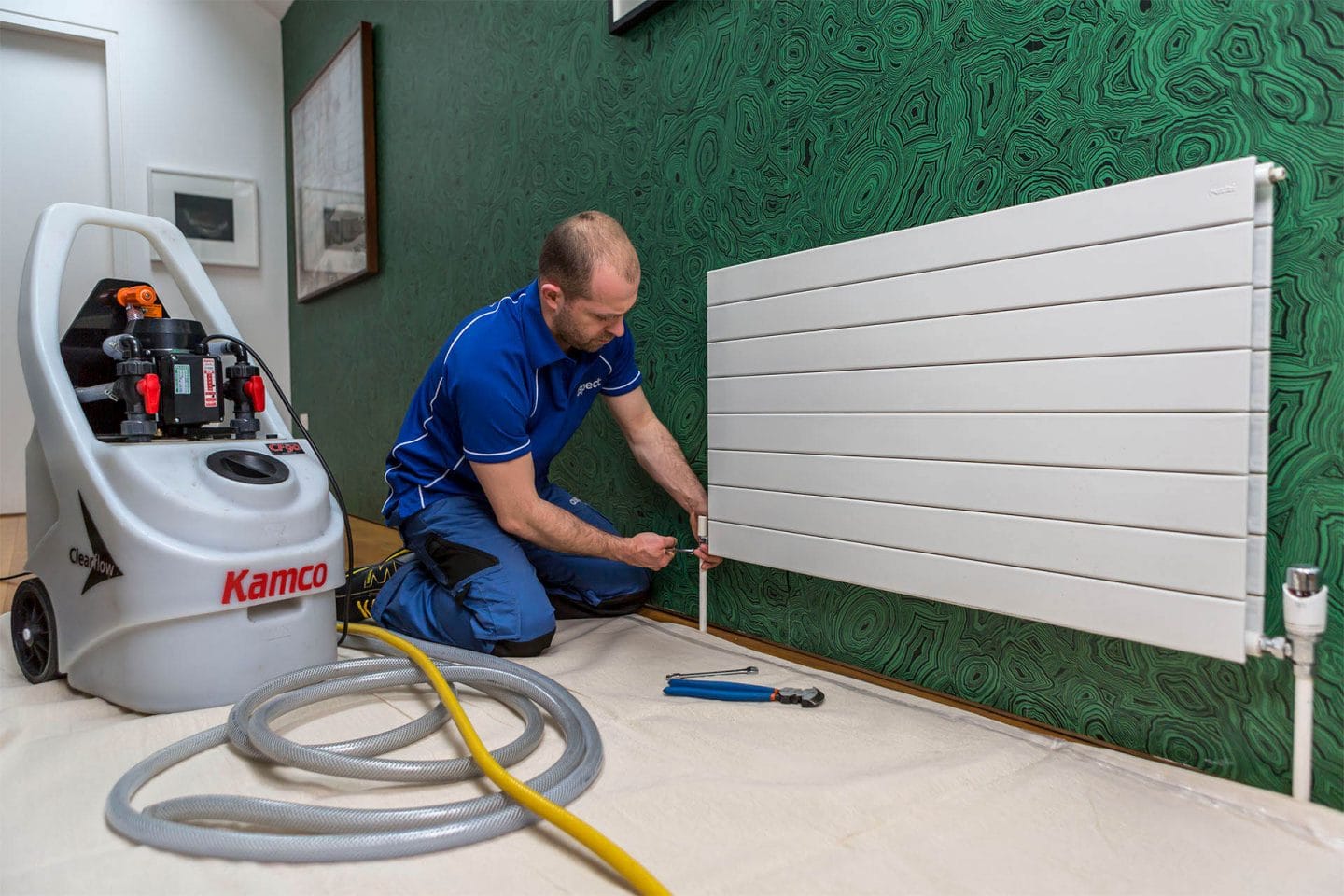Power Flush Cost
How much does it cost to power flush your radiators and central heating?
This guide will tell you all you need to know about power flushing costs, including labour and materials.
So let’s get started!

How Much Does a Power Flush Cost?
Do you want your central heating system to be power flushed?
We’ll break down how much you’ll need to spend on this work for different sized properties in the cost chart below.
What else is covered in this article?
This post will also go over any additional expenditures you might incur, as well as the exact supplier and labour costs required, as well as how long the job might take.
So, how much does power flushing cost on average?
Power flushing a two-bedroom flat costs around £320 to £360, with three-bedroom flats costing around £415 to £455 and four-bedroom flats costing around £470 to £530.

If you live in a two-bedroom house, the cost of having your central heating system power flushed will be roughly £385 to £425; if you live in a three-bedroom house, the cost will be £475 to £535; and if you live in a four-bedroom house, the cost will be £510 to £590.
What elements, however, can affect overall costs?
The cost of power flushing is determined by the property’s size, number of radiators, kind of central heating, number of heating engineers engaged, convenience of access, and location.
If you live in the southeast, particularly London, you should expect the highest rates. On the contrary, in places like Scotland, Northern Ireland, and the north of England, labour is generally less expensive.
Power Flushing Prices
| PROPERTY | COST |
|---|---|
| 2-bedroom Flat (4 radiators) | £320-£360 |
| 2-bedroom House (6 radiators) | £385-£425 |
| 3-bedroom House (10 radiators) | £475-£535 |
| 4-bedroom House (15 radiators) | £510-£590 |
Supply Costs of Power Flushing a Central Heating System
In most circumstances, if you engage a professional, supply costs will account for roughly 20% of the entire job cost.
The labour cost would account for around 70-80 percent of the total bill, with waste collection costs accounting for about 5% of the cost of power flushing central heating.
Before looking at the cost of materials for doing this DIY task, this section will lay out the material prices involved in a power flush job if done by a professional.
Please keep in mind that this is not a good DIY project, and you should only do it yourself if you know exactly what you’re doing and have the necessary expertise.
The majority of the time, homeowners should engage a licenced heating engineer.
If you hire a professional to power flush your radiators, the supply charges will be roughly £75 to £85 for a two-bedroom property, £90 to £100 for a three-bedroom flat, and £110 to £120 for a four-bedroom flat. Material costs for a 2-bedroom house should be around £80 to £90, £100 to £110 for a 3-bedroom house, and £125 to £135 for a 4-bedroom house.
Before attempting to power flush a central heating system on your own, you may need to purchase some supplies/materials.
You may need to rent or buy a power flushing machine, depending on the approach employed. This equipment can be rented for around £50 to £75 per day. However, purchasing one would likely cost between £400 and £1400.
A chemical power flushing cleaner product would cost between £5 and £20. It’s possible that you’ll suffer additional costs.
Supply Costs of Power Flushing
| PROPERTY SIZE | SUPPLY COSTS |
|---|---|
| 2-bedroom Flat – 4 Radiators | £75 to £85 |
| 3-bedroom Flat – 8 Radiators | £80 to £90 |
| 4-bedroom Flat – 11 Radiators | £90 to £100 |
| 2-bedroom House – 6 Radiators | £100 to £110 |
| 3-bedroom House – 10 Radiators | £110 to £120 |
| 4-bedroom House – 15 Radiators | £125 to £135 |
Cost of Supplies for DIY Job
| TOOL/EQUIPMENT | COSTS |
|---|---|
| Power Flushing Machine (Rent) | £90 to £125 |
| Power Flushing Machine (Buy) | £4000 to £1400 |
| Chemical Power Flushing Product | £5 to £15 |
What are the Additional Costs of Central Heating Power Flushing?
When you have your central heating system power flushed, you may incur a number of additional costs. Let’s look at a few cases that come up frequently.
Minimum Fee
A heating engineer may charge a minimum fee, which is either added to your total bill or factored into the overall prices.
This could be in the form of a daily labour cost for the latter. If a power flushing task takes a day and a half but you’re only charged by the day, you’ll still be charged for two days of labour.
Type of Central Heating System
Storage heating, wet systems, district heating, and warm air systems are the four primary types of central heating.
The cost of power flushing a system varies depending on the kind, layout, and nature of the system in question.
Size of Property/Number of Radiators
The larger a home is, the more radiators it is likely to have, and the number of radiators that need to be power flushed will, of course, have a direct impact on the time it takes to do the work. The more time you spend on a work, the more you’ll likely pay in labour.
Number of Heating Engineers
Power flushing is often done by a single heating engineer. The hourly or daily labour costs will be much higher if two or more professionals are working on the job.
Given that the more tradesmen there are, the faster the task would be completed, it’s difficult to predict if this will be a cost liability in the long run. It will all come down to how well a group of heating engineers collaborates.
Work Duration
The labour cost is determined by the length of time it takes to power flush. You’ll pay extra if the job takes longer. With the exception of a few circumstances, of course.
If you’re being paid by the day, for example, a one-day labour cost will apply regardless of whether the work takes five, six, or eight hours.
If you were charged a flat rate for the job, the length of time it takes will not be a factor, however such rates would be set in advance and the labourer would have a good notion of how long the project will take.
Tradesmen Costs for Power Flushing
The labour expenses are distinct from the supply prices, and they are simply how much you would pay on an hourly, daily, or, as previously indicated, as a set charge for the job. Let’s look at the labour costs of power flushing in more detail.
A two-bedroom flat will cost roughly £230 to £250 in labour, with a three-bedroom flat costing around £320 to £340, and a four-bedroom flat costing around £365 to £405 in tradesmen costs.
Power flushing a house costs roughly £270 to £290 for a two-bedroom house, £350 to £390 for a three-bedroom house, and £380 to £430 for a four-bedroom house.
The amount of heating engineers engaged, convenience of access, the type of central heating system being power flushed, and where you are located all influence labour expenses.
As a national average, heating engineers charge between £40 and £44 per hour. In Leeds, though, the hourly fee is around £34 to £40.
Similar prices may be seen across the north of England, with hourly labour costs in Liverpool ranging from £36 to £42 and Manchester from £35 to £41.
On the contrary, London, like much of the southeast, has higher rates, with an average heating professional in the capital charging around £53 to £59 per hour.
Some of the cheapest hourly rates in the country are below £30, such as in Pembrokeshire, Wales, where heating engineers charge roughly £26 to £28 per hour.
Heating engineer charges in the Suffolk Coastal District, on the other hand, range from £68 to £76 per hour on average.
How Long Does It Take to Power Flush your Radiators?
Power flushing radiators can take a long time depending on a number of factors. The duration of power flushing will be laid out in this section, followed by a discussion of the various time considerations.
Power flushing a two-bedroom flat takes on average 2-3 hours, 4-5 hours for a three-bedroom flat, and 6-7 hours for a four-bedroom flat.
A two-bedroom house should take 3-4 hours to clean, a three-bedroom house should take 5-6 hours to clean, and a four-bedroom house should take a full working day to clean.
The length of time it takes to complete the project will be determined by factors such as ease of access, the number of tradespeople hired, and the type of central heating system installed.
Duration of Power Flushing
| SIZE OF PROPERTY | DURATION |
|---|---|
| 2-bedroom Flat – 4 Radiators | 2-3 hours |
| 3-bedroom Flat – 8 Radiators | 4-5 hours |
| 4-bedroom Flat – 11 Radiators | 6-7 hours |
| 2-bedroom House – 6 Radiators | 3-4 hours |
| 3-bedroom House – 10 Radiators | 5-6 hours |
| 4-bedroom House – 15 Radiators | 1 day |
Benefits of Power Flushing
There are numerous benefits to having your central heating system power flushed, and we’ll go over a few of them in this section.

More Energy Efficient
Power flushing a central heating system will, in most situations, increase energy efficiency because the system will have to work less to obtain the same benefits.
If sludge is obstructing the heating system’s ability to function properly, it will not perform as well as it should.
As a result, power flushing can help you save money on your energy expenses.
Reduces Boiler Noises
Power flushing can improve the efficiency of your radiators and boiler, resulting in reduced noise.
May Increase Lifespan
Having your heating system power cleansed will help it last longer and work more efficiently.
This is because cleaner heating systems are less prone to wear and tear, and because the system is working more effectively, the chances are that it will last longer.
FAQs
Q: What is the purpose of power flushing?
A: It is the procedure of using water and chemicals to clean or unblock a central heating system.
Rust and sludge that has accumulated in your central heating system can be removed with power flushing.
Q: Are there any construction codes that pertain to power flushing?
A: Normally, no. When it comes to boilers and radiators, building codes often apply when a fixture is removed or installed.
More information is available at the Planning Portal. Please keep in mind that building rules in Scotland/Northern Ireland and England/Wales may differ.
Q: Should I get my central heating system power cleaned on a regular basis?
A: Your central heating system should be power flushed every five to six years, or whenever it is required.
Depending on the quality and materials used, certain systems will be more durable than others.
Q: How long would power flushing five radiators take?
A: It will take approximately three hours.
Q: Can I do a power flush myself?
A: Due to the work’s complexity, it’s advisable to employ an expert for this job. Only attempt this as a DIY project if you are particularly experienced and informed in this field.
If you do it yourself, you run the danger of inflicting major damage to your radiators and heating system.









